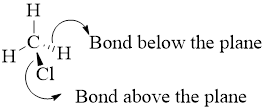
Concept explainers
(a)
Interpretation:
Enatiomers for the given compound has to be drawn using perspective formula.
Concept Introduction:
Perspective formulas show the 3D array of atoms in which the solid wedges indicate bonds projecting above the plane of the drawing and wedge shaded with parallel line indicate bonds projecting below the plane of drawing.
Example:

Enantiomers: These are stereoisomers that are not superimposable mirror images of each other and the configurations at all stereo genic centers are exactly opposite.
Enantiomer can be drawn by replacing the wedge with a dash from the perspective formula of a compound.
Chiral center: A chiral center is defined as the tetrahedral carbon atom in an organic molecule that is connected to four non-identical groups/substituents. It is sometimes known as a stereo genic center.
An achiral carbon is a carbon having two or more identical groups around it.
(b)
Interpretation:
Enatiomers for the given compound has to be drawn using perspective formula.
Concept Introduction:
Perspective formulas show the 3D array of atoms in which the solid wedges indicate bonds projecting above the plane of the drawing nad wedge shaded with parallel line indicate bonds projecting below the plane of drawing.
Example:

Enantiomers: These are stereoisomers that are not superimposable mirror images of each other and the configurations at all stereo genic centers are exactly opposite.
Enantiomer can be drawn by replacing the wedge with a dash from the perspective formula of a compound.
Chiral center: A chiral center is defined as the tetrahedral carbon atom in an organic molecule that is connected to four non-identical groups/substituents. It is sometimes known as a stereo genic center.
An achiral carbon is a carbon having two or more identical groups around it.
(c)
Interpretation:
Enatiomers for the given compound has to be drawn using perspective formula.
Concept Introduction:
Perspective formulas show the 3D array of atoms in which the solid wedges indicate bonds projecting above the plane of the drawing nad wedge shaded with parallel line indicate bonds projecting below the plane of drawing.
Example:

Enantiomers: These are stereoisomers that are not superimposable mirror images of each other and the configurations at all stereo genic centers are exactly opposite.
Enantiomer can be drawn by replacing the wedge with a dash from the perspective formula of a compound.
Chiral center: A chiral center is defined as the tetrahedral carbon atom in an organic molecule that is connected to four non-identical groups/substituents. It is sometimes known as a stereo genic center.
An achiral carbon is a carbon having two or more identical groups around it.
Want to see the full answer?
Check out a sample textbook solution
Chapter 4 Solutions
Essential Organic Chemistry (3rd Edition)
- Draw the enantiomer of the following compounds:arrow_forwardDraw enantiomers for each of the following using a. perspective formulas. b. Fischer projections. 1. CH3CH-BrCH2OH 2. ClCH2CH2CH-CH3CH2CH3 3. CH3CH-CH3-OHCHCH3arrow_forwardDraw a three-dimensional structure of a chiral compound with the molecular formula of C4H4Cl2 that does not have a stereogenic carbon. In addition, draw the enantiomer of this compound.arrow_forward
- What is the pair of enantiomer for this structure? Draw in 3D representationarrow_forwardIndicate whether each statement is true or false: An equal mixture of enantiomers is not optically active. All (S)-enantiomers rotate plane polarized light counterclockwise. The ratio of enantiomers in a sample can be reported as an enantiomeric excess.arrow_forwardThere are nine constitutional isomers of molecular formula C7H16. 1) For the two chiral constitutional isomers, draw in Fischer projection formula the enantiomers of each. 2) Name, according to IUPAC standards, each of the enantiomers you drew in #4 above.arrow_forward
- For molecule CH3CH2CH(OH)CH3a. Identify chiral centreb. Draw a pair of enantiomers using 3-dimensional structurearrow_forwardLocate the chirality center in each compound and draw both enantiomers.arrow_forwardLocate with an asterisk the stereogenic centers (if any) in the following structure: B. C6H5CH2CH(OH)CO2Harrow_forward
 Chemistry for Today: General, Organic, and Bioche...ChemistryISBN:9781305960060Author:Spencer L. Seager, Michael R. Slabaugh, Maren S. HansenPublisher:Cengage Learning
Chemistry for Today: General, Organic, and Bioche...ChemistryISBN:9781305960060Author:Spencer L. Seager, Michael R. Slabaugh, Maren S. HansenPublisher:Cengage Learning
